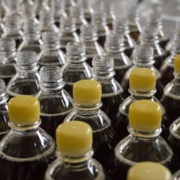7 April 2020
Plastic packaging is hardly recycled in the United States, even though it carries the universal symbol of recycling, a triangle of chasing arrows. The numbers inside the symbol are material identification codes and do not indicate that the type of plastic is actually recycled. In fact, returned packaging is burned or dumped massively. Greenpeace USA concludes in a thorough investigation that consumers are, therefore, misled.
On plastic packaging, you can often find claims that they are recyclable. In the triangle of chasing arrows you may see a number. There are seven numbers, each for a different type of plastic. Greenpeace USA spoke to many of the 367 MRFs (Material Recovery Facilities) in the United States and asked which plastics they do and do not accept. Only a fraction appears to be recycled.
Disappointing results
For the most common plastic products, Greenpeace checked whether they are accepted for recycling in the United States. The results are appalling:
- 0% for plastic coffee cups and multi-layer packaging (pouches);
- 1% for plastic cutlery, straws, and stirrers;
- 4% for plastic bags;
- 7% for plastic cups.
All
packaging falling under material identification codes 3 to 7 appears to have
little or no treatment. Only PET and HDPE bottles and containers (codes 1 and
2) are always (100%) accepted for recycling.
Misleading
The U.S.
Federal Trade Commission (FTC) has established rules regarding packaging
information. A company can only claim that their packaging is recyclable if
more than 60% of the US population have access to municipal recycling. And also
if there is prove that the collected materials is indeed recycled and made it into
recycled feedstock. The FTC rule is violated at present, because recycling
facilities are unable to process the various plastic types. The packaging,
however, is sold as recyclable and consumers are put in the dark.
Greenpeace notes that producers are massively violating the FTC rules and calls on them to categorically waive the recycling claim on all packaging covered by recycling codes 3 to 7. At least one legal action has recently been initiated using the Greenpeace report as evidence.
You might also like






